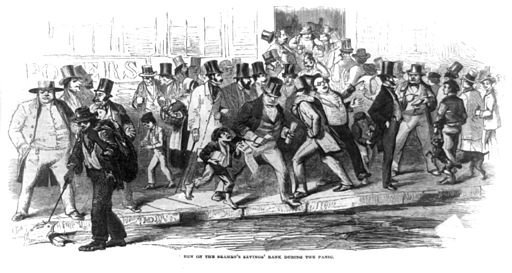
Run on the Seamen's Savings' Bank during the Panic of 1857. Public domain.
US president Joe Biden "stresses that Silicon Valley Bank is not getting a bailout," The Hill reported on March 13.
"[N]o losses will be borne by the taxpayers," he said of the federal government's decision to cover depositor losses in excess of $250,000. "Instead, the money will come from the fees that banks pay into the Deposit Insurance Fund."
But Biden's explanation doesn't support Biden's claim. The bank's customers --- and, by extension, the bank itself --- are definitely getting a bailout. Here's why:
The FDIC is, as its name implies, an insurance proposition. The premiums banks pay are based on the amounts they have in deposits, and an FDIC opinion of how risky the bank's practices are.
Let us now turn our attention to a great film about the LAST big US financial collapse, The Big Short. By way of explaining his pitch for betting that collapse was coming, Jared Vennett (a fictional character based on a real person) tells some investors, "I'm standing in front of a burning house and I'm offering you fire insurance on it."
In the case of Silicon Valley Bank, Signature Bank, and likely other banks to follow, the FDIC is standing in front of burning multi-million dollar houses insured for $250,000 and offering to pay the full value of the houses instead of the amount insured.
Who's covering the difference?
For the moment, all the banks which haven't collapsed yet.
Which means: The CUSTOMERS of all the banks which haven't collapsed yet. It's those customers who actually pay those FDIC premiums. Banks don't turn profits by eating their costs of doing business. Depositors earn a little less interest or pay slightly higher fees, or the bank charges borrowers higher interest and fees.
Those customers are, presumably, taxpayers.
Which means that yes, taxpayers are indirectly bearing the costs of the bailout.
And if --- no, let's be honest, WHEN --- more banks start going under because they put money into investments that tanked their liquidity (that is, their ability to cover potential surges in depositor withdrawals), and the FDIC runs out of money to cover this new "any amount instead of just what was actually insured" policy, the taxpayer funding will go from indirect to direct.
To add insult to injury, the depositors getting bailed out could have avoided the whole situation by spreading their deposits across different banks, with no more than $250,000 at each bank.
Why should their bad judgment, and their bankers' bad judgment, be expensed to you?
It shouldn't. But as we saw with the 2007-2008 collapse, American finance is a house of cards because it can be. "Privatize the profits, socialize the losses" government policy ensures that the costs of poor decision-making aren't borne by the poor decision-makers.